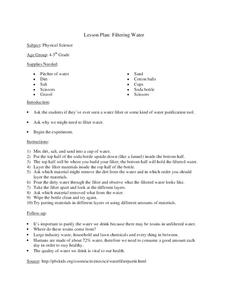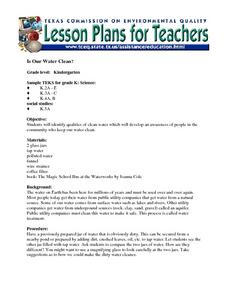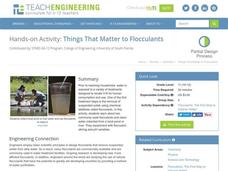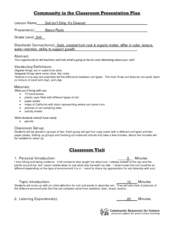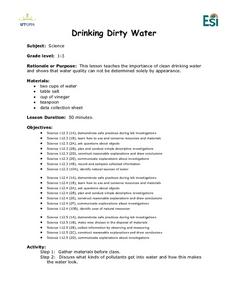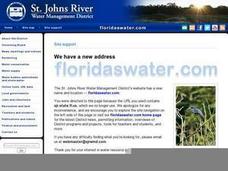US Environmental Protection Agency
Water Purification by Evaporation and Condensation
This easy-to-perform demonstration shows students how the water cycle, specifically the processes of condensation and evaporation, purifies Earth's water supply. Just mix up some water, dirt, and gravel in a glass bowl, place a cup in...
US Environmental Protection Agency
Thirstin's Wacky Water Adventure
Make a splash with young scientists as you teach them all about water using this activity packet. Thirstin, a cartoon glass of water, walks children through the water treatment process, teaches them about different sources of water, and...
Foundation for Water & Energy Education
What is the Water Cycle? Activity B
Curious physical scientists follow a lesson on the properties of water with this lesson on distillation. They observe a miniature water cycle model that filters dirty water into clean water. These two lessons combined are an enriching...
Curated OER
Water Pollution
Here is a fine lesson for fifth graders that will give them an idea of the variety of impacts that human-introduced pollutants have on the environment. After an initial class discussion and teacher-led demonstration, pupils brainstorm...
Safe Drinking Water Foundation
Make Your Own Water Pollution
Using the polluted water that was made in the prior lesson, your young environmentalists will mix pollutants together in an experiment. Then, they will design a water filter that will clean the polluted water to use in the next lesson....
Kenan Fellows
Designing a Water Treatment Plant
How does dirty water get clean enough to drink? After viewing a PowerPoint that outlines the process water goes through at a water treatment plant, groups work together to design a chlorination chamber for a treatment plant.
San Francisco Public Utilities Commission
Let's Save Water: Water Conservation
Did you know that cutting down your shower by one minute a day can save five gallons of water? Learn about water conservation with a science reading activity. After kids finish reading key terms and water-saving tips in a reading...
Curated OER
The Wonders of Water - Biology Teaching Thesis
Students name 3-5 aesthetic values of the Potomac River. They state the importance of water in their own words. Students describe what Earth Day is and why it is important. They list 5-7 ways that they can help minimize water pollution.
DiscoverE
Water Pollution Cleanup
How do scientists determine the best method for removing pollutants from our water sources? Environmental scholars experiment with pollution clean-up options to discover which are the most cost-effective, fastest, and most thorough....
Curated OER
Who Dirtied The Water/Clean Water: Is It Drinkable?
Students enter the room, receive a film canister that contains materials that be added to the dirty water bell jar. They record on their data table who or what is doing the adding and the actual substance that has been added to the bell...
Curated OER
Filtering Water
Students investigate the need for filtered water. In this filtered water lesson, students explore the health hazards posed from consuming unfiltered water. Students construct a water filtration device.
Earth Day Network
Staying Green While Being Clean
Clean up the environment with a lesson plan that focuses on replacing hazardous cleaning supplies with green, environmentally-friendly products. Using a dirty patch of surface as a control area, kids clean other parts of various surfaces...
Curated OER
Dirt: Making Dirty Water Clean!
Fourth graders study soil and water. In this water lesson students work in groups and use a filter to clean water.
San Francisco Public Utilities Commission
Recycled Water: A Smart Way to Reuse Water
Learn about wastewater and recycled water with a science reading activity. After learners finish a two-page passage about conserving the water supply, they answer six comprehension questions about what they have read.
Curated OER
Is Our Water Clean?
Students identify qualities of clean water and develop an awareness of people in the community who keep our water clean.
Teach Engineering
Things That Matter to Flocculants
How does the dirt get out of your drinking water? A hands-on activity introduces the use of flocculants to help clear solid particles out of water. The plan walks learners through the process of setting up an experiment that controls the...
Curated OER
Muddy Waters
Students read the book the Dirt Boy. In this design and problem solving lesson plan, students create a way to clean muddy water. Students give their ideas and discuss them. The teacher shows a filter and demonstrates what it does to the...
Curated OER
Dirty Water: A Case Study
Students identify the causes of arsenic contamination. They list the world organizations involved in ensuring sanitary water supplies. Students describe various methods to mitigate arsenic contamination.
Curated OER
Is Our Water Clean?
Students identify qualities of clean water which will develop an awareness of people in the community who keep our water clean. This lesson plan has a literature tie-in with the "Magic School Bus" series.
Curated OER
Soil Isn't Dirty; It's Diverse!
Second graders participate in a soil activity. In this soil instructional activity students complete a worksheet describing different soil types and the organic and inorganic things found in them.
Curated OER
Drinking Dirty Water
Students consider the importance of clean drinking water. They conduct a taste experiment with water, adding incremental drips of salt and vinegar to determine at which point it doesn't taste drinkable.
Curated OER
Lesson 11 - Potable Water
Students investigate the meaning of potable water and water reuse. They define water quality and quantity problems. They complete worksheets, a quiz and design a poster.
Curated OER
Water Pollution
Fifth graders observe and record what happens when household products are added to a tank of water to depict water pollution. They brainstorm ideas of how to clean the contaminate out of the water before watching demonstrations of...
Curated OER
Foul Water Lab
Learners use field practices to clean foul water, they comprehend the differences in solution and solutes. They work in groups and discuss the lab instructions. Students start with oil-water separation technique. They complete a...












